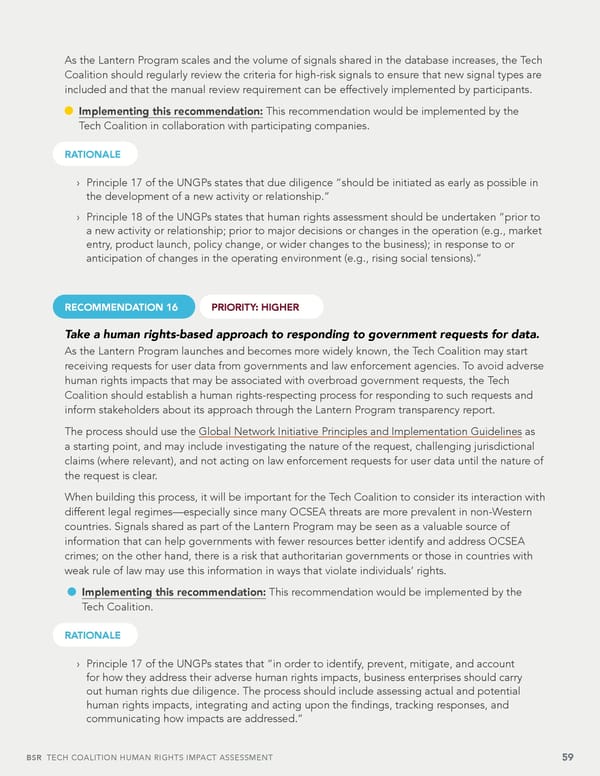As the Lantern Program scales and the volume of signals shared in the database increases, the Tech Coalition should regularly review the criteria for high-risk signals to ensure that new signal types are included and that the manual review requirement can be effectively implemented by participants. Implementing this recommendation: This recommendation would be implemented by the Tech Coalition in collaboration with participating companies. RATIONALE › Principle 17 of the UNGPs states that due diligence “should be initiated as early as possible in the development of a new activity or relationship.” › Principle 18 of the UNGPs states that human rights assessment should be undertaken “prior to a new activity or relationship; prior to major decisions or changes in the operation (e.g., market entry, product launch, policy change, or wider changes to the business); in response to or anticipation of changes in the operating environment (e.g., rising social tensions).” RECOMMENDATION 16 PRIORITY: HIGHER Take a human rights-based approach to responding to government requests for data. As the Lantern Program launches and becomes more widely known, the Tech Coalition may start receiving requests for user data from governments and law enforcement agencies. To avoid adverse human rights impacts that may be associated with overbroad government requests, the Tech Coalition should establish a human rights-respecting process for responding to such requests and inform stakeholders about its approach through the Lantern Program transparency report. The process should use the Global Network Initiative Principles and Implementation Guidelines as a starting point, and may include investigating the nature of the request, challenging jurisdictional claims (where relevant), and not acting on law enforcement requests for user data until the nature of the request is clear. When building this process, it will be important for the Tech Coalition to consider its interaction with different legal regimes—especially since many OCSEA threats are more prevalent in non-Western countries. Signals shared as part of the Lantern Program may be seen as a valuable source of information that can help governments with fewer resources better identify and address OCSEA crimes; on the other hand, there is a risk that authoritarian governments or those in countries with weak rule of law may use this information in ways that violate individuals’ rights. Implementing this recommendation: This recommendation would be implemented by the Tech Coalition. RATIONALE › Principle 17 of the UNGPs states that “in order to identify, prevent, mitigate, and account for how they address their adverse human rights impacts, business enterprises should carry out human rights due diligence. The process should include assessing actual and potential human rights impacts, integrating and acting upon the 昀椀ndings, tracking responses, and communicating how impacts are addressed.” BSR TECH COALITION HUMAN RIGHTS IMPACT ASSESSMENT 59
 Tech Coalition Human Rights Impact Assessment of the Lantern Program Page 58 Page 60
Tech Coalition Human Rights Impact Assessment of the Lantern Program Page 58 Page 60